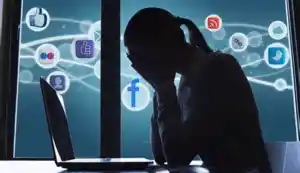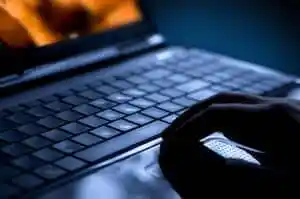The intimacy of the female body is highly coveted by the male in social life. In the case of Haiti, this means that making public a woman’s private body parts or her sensitive documents and other elements that are supposed to remain private, or harassing her, even making threats online, tends to be taken by society much less seriously than if it were a man who would declare that his wife does not cook for him or is unfaithful. Oh the whore, one might say a priori and wrongly! As much as physical violence leaves scars, online violence can also have unimaginable consequences on those who are victims of it, especially women and girls.
A career journalist, Arielle (not her real name) has yet to experience the shock of her life. Midnight 13, while she was sleeping in her nightgown, autumn 2021, there is this soccer player from Léogȃne (we will withhold his name for not having received his version yet at the time of writing this article), who emigrated to Brazil and then to the United States of America and was looking for easy prey to fulfill his fantasy of dominant male, according to the declared victim. Jumping out of her sleep at the ring of her phone, without knowing it, Arielle picked up the phone, and it was a video call on Messenger. Suspender removed, breasts in evidence, seeing this, the caller had time to take screenshots, without her knowing anything until then.
From admiration to shock
It all started with an admiration for the work of the journalist. The footballer took care to find the number of the young woman, following his participation in a radio program. At the beginning, he showed her all his admiration, that passes by text messages all day long, to calls without stop, to end up to the harassment.
Once, he demanded that I say the words “I love you” on the phone, it was as if he was recording the conversation, Arielle said, adding that her admirer wanted to become her companion at all costs. What she always refused, she explains. The journalist says she was not only harassed online, but also threatened by her attacker, whom she had to block in just a week and a half of intense conversation on social networks and report his account. The latter even had time to create another account to continue to harass and threaten her, says Arielle. Not having been able to achieve his goals, the Leoganese who wanted so much to start a friendly and/or romantic relationship with the journalist, went from a blow of excessive appreciation to cyberbullying/cyberharassment, even to non-consensual sexting and even to doxing, among other forms that online violence can take.
Arielle reveals that she has had a hard time recovering from this situation, which has shaped her behavior towards the people she interacts with or has professional relationships with, even outside of social networks. Meanwhile, Arielle also makes us understand that she was not the last victim of the footballer who escaped virtually unscathed, she complains. So many Haitian women suffer online assaults on their femininity without the law being able to intervene, leaving injuries and shocks often untreated, laments Arielle.
What we learn from online violence
According to UN Women, the United Nations entity dedicated to gender equality and women’s empowerment, online or digital violence against women in particular refers to any act of violence committed, assisted or aggravated by the use of information and communication technologies (cell phones, internet, social media, computer games, text messaging, emails, etc.) simply because they are women. This violence so to speak can take many forms.
“The soccer player, (who goes by the name Robert) kept sending me messages with the goal of intimidating me, forcing me or inviting me to satisfy all his whims,” Arielle explains. This is what the UN agency considers to be part of cyberbullying, which consists of sending intimidating or threatening messages to people through the Internet.
With the screenshots, Robert thought he could blackmail Arielle. “If you refuse to put you with me, I will publish the image, albeit cloudy, of your breasts on social networks, he threatened me,” she confessed. In this sense, sending messages with sexual connotations or non-consensual sexting involves the electronic transmission of explicit messages or photos without the consent of the recipient. Hence, non-consensual sexting.
Another form of online violence is doxing. This is the public dissemination of the victim’s private information or identity. The attacker even tried to attack her from her personal social media accounts, Arielle says, noting that she was able to have a moment’s peace with Robert simply because he lives in the U.S., where the laws on the issue are quite strict. This is not the case in Haiti, where specific texts on the issue are non-existent.
However, cases of gratuitous insults, hate speech, and the sharing of false information on the web are not to be dismissed as themes of online violence.
As a result, it should be emphasized that, despite its many benefits, the Internet can also be a hateful and hostile space, especially for women, young girls, racial and ethnic minorities, LGBTQ+ people and other marginalized communities, who are more likely to see their image exploited online, as the United Nations population organization (UNFPA) has taken care to highlight.
The situation of digital violence in the world and in HaitiIn the midst of the social network boom, resulting from the dizzying development of new information and communication technologies (NICT), male domination as it is in social life today has not shied away from being transported to where, for the most clever, it is possible to adopt a certain digital identity by hiding behind fictitious characters with the intention of doing terrible harm.
Citing a study conducted only on people over 18 years in 2020, from the Economist Intelligence Unit, the United Nations Population Fund says that 85% of women worldwide have experienced or witnessed digital violence against other women, while 57% of women have had their videos or images online abused or manipulated. Where this form of violence is more alarming is when Sensity AI, cited by UNFPA, claims that 96% of online deepfake videos, i.e. digitally altered, are pornography featuring women. Why then are women the most victims of online violence, one might ask?
Common in Haiti, after a breakup, a man takes the pleasure to decide to publish the private parts of his ex-girlfriend by revenge, will to degrade or to hurt, without worrying, in addition to the social impacts, the psychological damage that could have such actions on the woman. Moreover, many women in the media or in the movie industry, as we all know, have already been through this. Is it not that we were simply satisfied not to propagate the images without any sanction against these men. We will even forget their names. But the victims are. Normal to exploit the vagina and no need to be punished the fact of having a penis in Haiti? If, for many, such a questioning can border on indecency, the fact remains that gender-based violence deserves urgent action in order to overcome male domination, so that all of us, men and women alike, can be equal in all spheres of social life. This is what Arielle believes, judging that rapists, sexual criminals have too often gone unpunished in the country. Such a precedent can only encourage potential criminals, not fearing any dissuasive action, to commit their crime.
On the other hand, if we refer to the data provided by the Ministry of Women’s Affairs and Women’s Rights (MCFDF), the Haitian Institute of Statistics and Informatics (IHSI) or UNFPA in Haiti through the document “Informing on gender-based violence”, relating to the different forms of violence against women (domestic violence, sexual violence, physical violence, forced marriage, etc.), we realize that the number of women who are victims of violence is very high. ), we realize that the rates of victims are increasing, and even more so online, as we move towards a 100% digitalized world.
From technology to online violence
Involved in computer coding and calling himself Rabbi of the Woods, there is this hacker who invites the world to understand that today we live in a 100% digital world, digitized, and that everything that happens stems from the screen, from the internet. Regretting the fact that there are not enough people aware of this and who know how to live in this environment, the hacker advocates what he considers to be a digital consciousness.
Speaking on France Bleu Paris’ 5 sur 5 program in March 2021, Rabbin des Bois said that there are two kinds of hackers: Those who will exploit the vulnerability of a system or a person to enrich themselves (…) and those who want to alert. It is worth mentioning here the fact that some individuals are purposely using technology to do harm by hiding behind a false identity.
Now claiming to be a whistleblower on the issues of cybersecurity, the hacker Rabbi des Bois has sounded the alarm on the fact that, with regard to individual freedoms, and therefore human rights, privacy is threatened with the Internet, social networks and cell phones. Messenger for example is very datavor. The application will “collect absolutely everything on his phone”, we read on francebleu.fr/emissions/le-5-sur-5-de-France-bleu-paris/107-1/rabbin-des-bois-hacker.
Author of the books “Lève-toi et Code, Confessions d’un hacker” and “Princesse Data” published by La Martinière, Rabbin des bois did not fail to draw the attention of users on what generally makes them vulnerable. He invited them, to protect themselves, to use a specific password for each platform, to use pseudonyms, to differentiate between personal and professional identities, to avoid clicking on any link…. A question of “digital awareness, digital hygiene” he said.
In addition, to deepen the issue of violence in relation to technology, ZoomHaïtiNews went to meet Sandy Clervil. Engineer in computer science, certified in security and technological infrastructure, he explained us that to act, the scammer can hide behind an electronic gadget in order to carry out his crimes. In a physical space, one could have recourse, but at this level, the damage can be considerable, and the victim may not know what to do, except denounce or delete his account (WhatsApp, Facebook, Instagram, Twitter, Telegram, etc.), says the engineer.
Regarding the use of applications, Sandy Clervil says that one must accept certain conditions related to virtual life. However, he added, one of the important steps to take, in case of online violence is to block or delete his account, while taking care first to write and ask for a recovery of all its records. Because, once the data (personal or otherwise) are entered on an application server, it is difficult to get them out or disappear.
On the fact that most of the time, it is women who are the most victims of online violence, the computer engineer invites the victims to break the silence by denouncing the identified perpetrators. According to him, this will limit the actions and presence of the accused on social networks. The computer expert also calls for legislation on this phenomenon of online violence.
Virtual violence, real consequences
In the opinion of the Haitian psychologist Clairvina DOSSIÉ, violence, whether online or in real life, has disastrous consequences on the mental and physical health of young people and represents an additional stress factor. Arielle, the reported victim from the beginning, told us that as a result of her abuser’s constant threats, she was terribly distressed, traumatized, and was not able to return to work until a week later.
Since this aggression with Robert, Arielle, who had to resort to psychological care, lives not only with this constant fear of social networks but also with the feeling that any new contact could be a potential stalker.
From lack of enforcement and lawlessness to systematic impunity
The system of impunity in Haiti fosters all kinds of violence, according to several human rights organizations in Haiti. Few justice cases are successful, depending on whether one has great economic means. Faced with such an open field, potential criminals or aggressors may find themselves not worrying about what might happen to them, knowing that the Haitian judicial system is corrupt to the core. Recent international sanctions against Haitian Justice Minister Berto Dorcé and Interior Minister Liszt Quitel for colluding with alleged gang leaders fueling the chaos in Haiti illustrate this point. Society is content with the fact that they either resign or are dismissed from their positions. Otherwise, nothing more has happened to date on the Haitian side. Whether a president of the Republic is assassinated, a president of the Bar Association is assassinated, or a principal, teacher or other professional is released after assaulting, raping or killing a woman, the judicial system is still lagging behind. Then we move on.
However, it is important to note that Haiti does not have specific laws on Gender Based Violence (GBV), let alone online violence. However, chapters of the penal code dealing with assault and battery are applied to all types of violence. Moreover, the international conventions related to gender-based violence (GBV), ratified by Haiti, should also be considered.
However, it is not enough to report a person who is known to be a perpetrator of online violence or to report his or her account, when no legal proceedings have been initiated. And in the best case scenario, when it happens, it’s just a cold case,” laments Arielle.
In addition, the United Nations Population Fund (UNFPA) has warned that copyright infringers face criminal penalties. Their content on digital platforms is also quickly removed. This is not the case for victims of online violence, who face obstacles and have few legal rights, the UN agency laments.
UNFPA advocates for a real law criminalizing violence perpetrated on the Internet and most often directed against women, including online violence, thus calling on technology companies and policy makers, instead of putting more emphasis on copyright protection, to also focus on online human rights. Hence the UNFPA-initiated “bodyright” movement, which is seen as a new copyright for the human body, demanding that images of our bodies be given the same respect and protection online as the copyrights granted to music, movies and even corporate logos.
That’s why the United Nations Population Fund joined the World Wide Web Foundation in calling on Facebook, Google, TikTok and Twitter to make women’s online safety a priority by holding these companies accountable for commitments made at the 2021 Generation Equality Forum in Paris.
Ending online violence in Haiti, where to start?
What would happen if a woman decided to make public an image of a penis (erect or not) attributed to a known or unknown man on social networks? Apart from moral considerations, would it be more shocking to the public than if it was in fact a vagina published by a man? This could lead to comments about the use of women’s bodies for domination or exploitation, giving men any right to act on the basis of their masculinity. In other words, raping or assaulting a woman would seem normal, while punishing a rapist seems to cost a lot to the social order.
The logic of double standards, has well taken its place in cases where, the images of the former director of the Haitian National Office for Migration (ONM), Eude Lajoie masturbating in 2018 in front of his webcam and those of the actress Widiana Bourdeau in 2021, were posted online. The speeches were much more about the size of the director’s penis, his voice, or his position as a state official. While for the actress, many gave the images a connotation of a whore without even knowing the crux of the matter. And in the end, if we refer to the last words of Arielle in her testimony, after having tried everything to protect herself from Robert, it ended as if nothing had happened. The man quickly resumed his life course, leaving his victim, then left to conquer another, and so on.
As a result, nine out of ten women (92%), UNFPA tells us, say that online violence affects their sense of well-being, and more than a third (35%) have experienced mental health problems due to online violence. This violence also inhibits authentic expression and limits the professional and economic livelihoods of those who rely on online spaces and social networks. This further underscores the urgency for national and international actors to act on the incentive levers to ensure the protection and respect of human rights online as elsewhere. Criminal laws have not reduced feminicide, sexual, physical and psychological violence in Haiti. This clearly shows that the institutions that are supposed to enforce and respect the laws must necessarily fulfill their mission, in which case they must prevent violence and be ready to crack down on absolutely all those who are found guilty.









